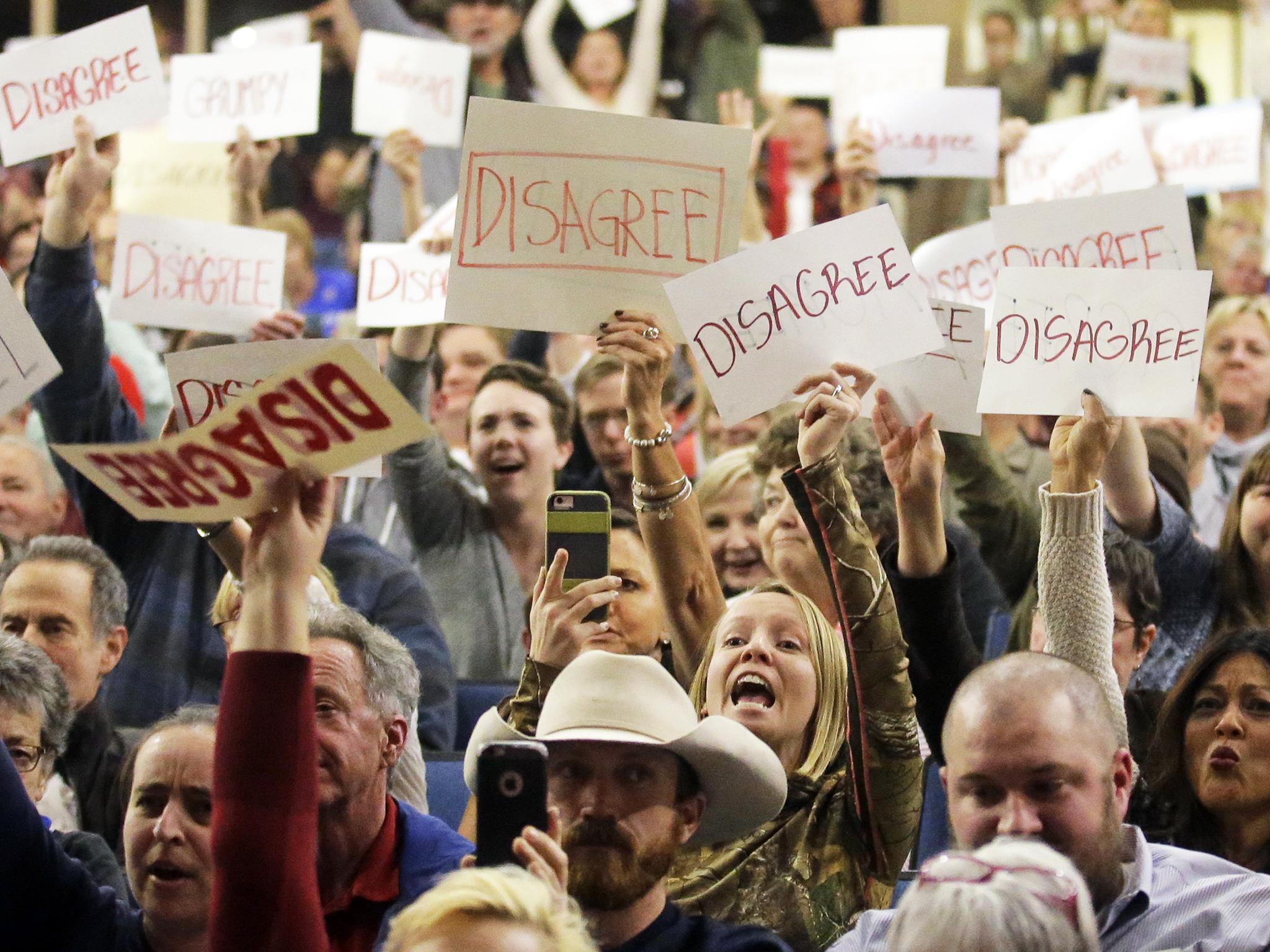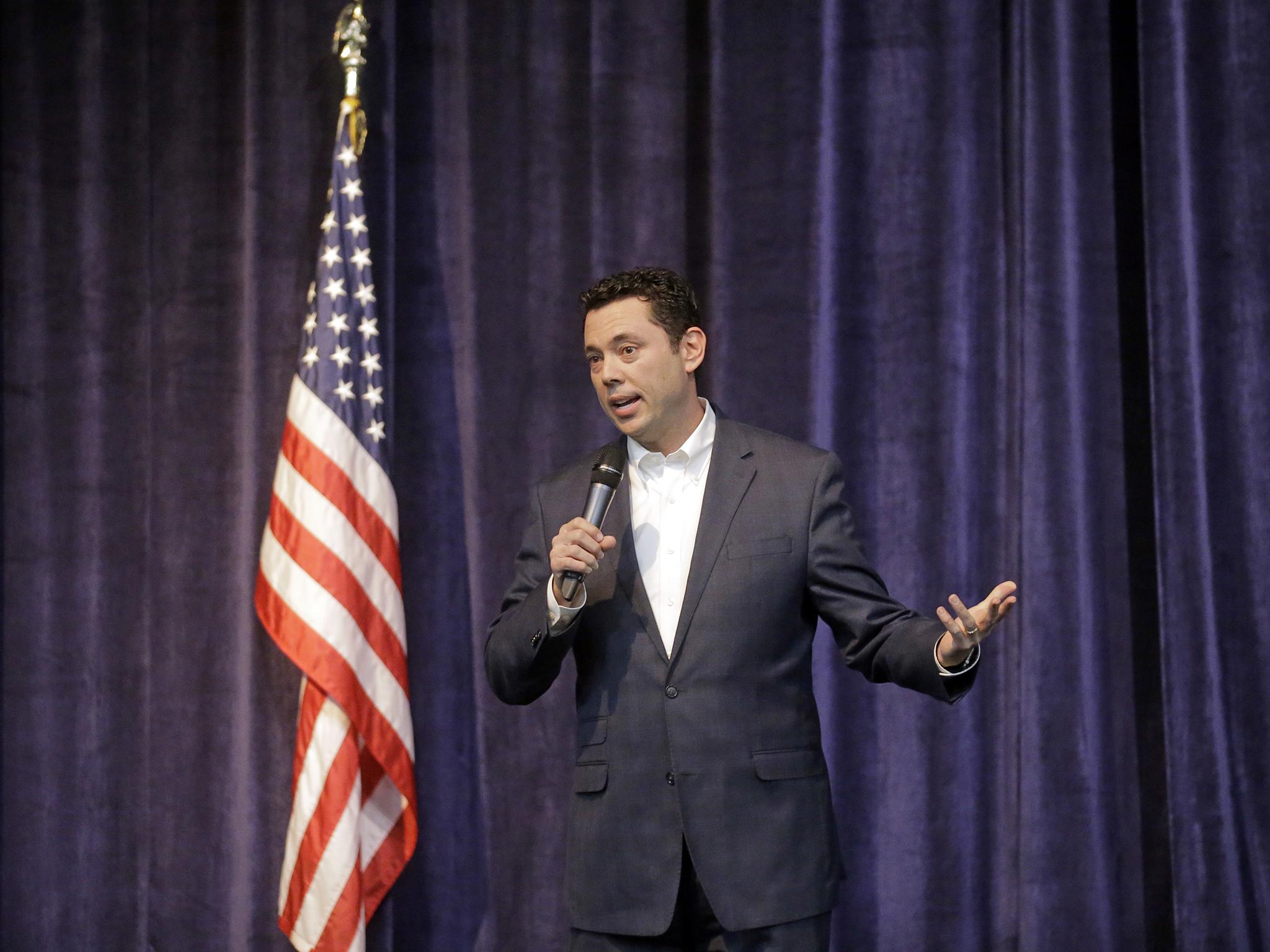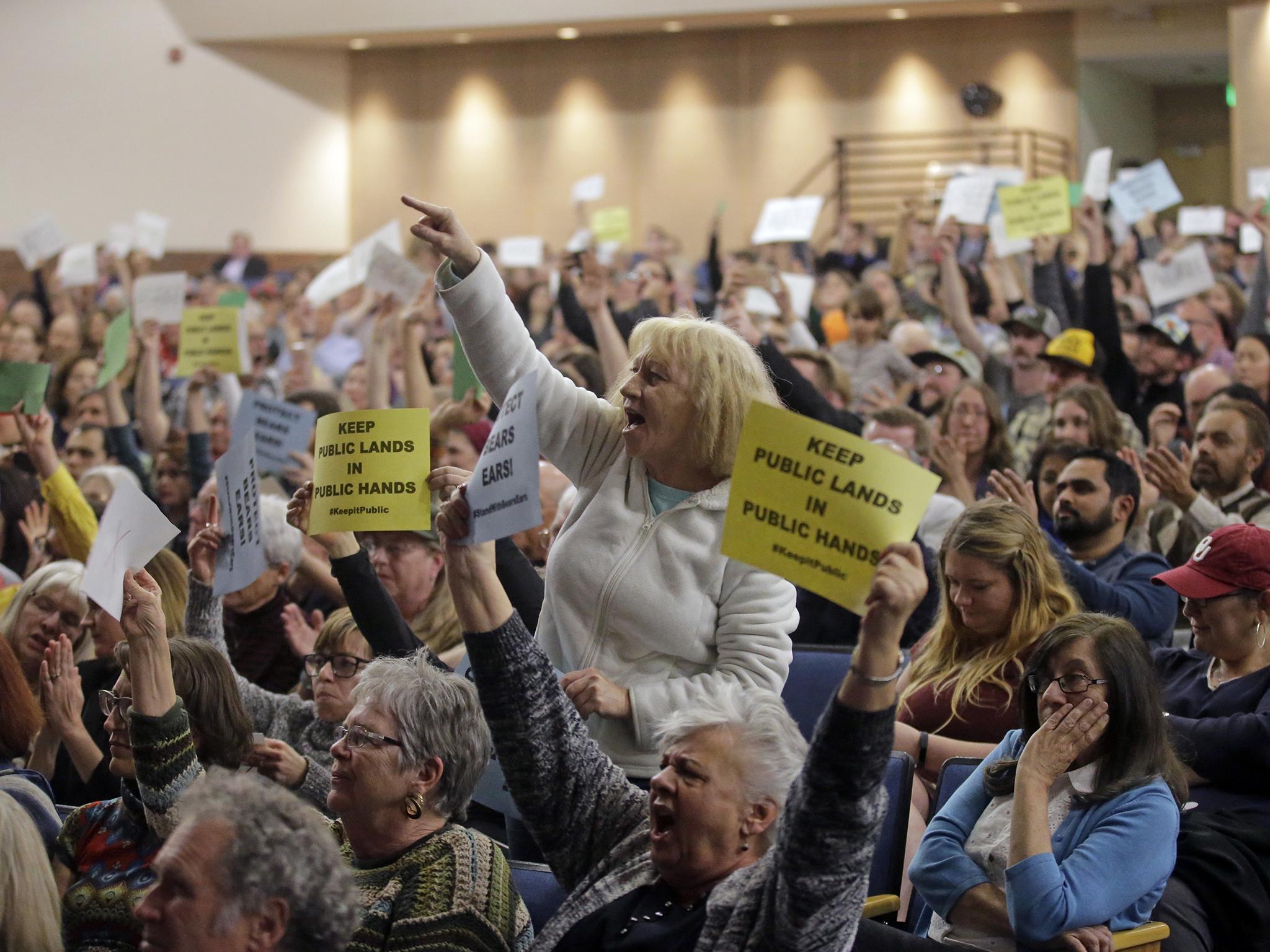Republican town halls attract swarming crowds and hostile questions as opposition to Trump executive orders mobilises
Congress Representatives in Utah, Tennessee, Michigan and California have been overwhelmed by angry constituents

Your support helps us to tell the story
From reproductive rights to climate change to Big Tech, The Independent is on the ground when the story is developing. Whether it's investigating the financials of Elon Musk's pro-Trump PAC or producing our latest documentary, 'The A Word', which shines a light on the American women fighting for reproductive rights, we know how important it is to parse out the facts from the messaging.
At such a critical moment in US history, we need reporters on the ground. Your donation allows us to keep sending journalists to speak to both sides of the story.
The Independent is trusted by Americans across the entire political spectrum. And unlike many other quality news outlets, we choose not to lock Americans out of our reporting and analysis with paywalls. We believe quality journalism should be available to everyone, paid for by those who can afford it.
Your support makes all the difference.Republicans in deep-red congressional districts spent the week navigating massive crowds and hostile questions at their town hall meetings – an early indication of how progressive opposition movements are mobilising against the agenda of the GOP and President Donald Trump.
Angry constituents swarmed events held by Representatives Jason Chaffetz (Utah), Diane Black (Tennessee), Justin Amash (Michigan) and Tom McClintock (California). The crowds filled the rooms that had been reserved for them; in Utah and Tennessee, scores of activists were locked out. Voters pressed members of Congress on their plans to repeal the Affordable Care Act (ACA), on the still-controversial confirmation of Education Secretary Betsy DeVos and even on a low-profile vote to disband an election commission created after 2000.
House Republicans had watched footage earlier this week of McClintock’s raucous town hall in Northern California and his police-assisted exit – a warning of what might come. And with Congress scheduled for a week-long recess and a raft of additional town halls starting on 18 February, the warning may have been warranted.
On Thursday, participants were spurred to show up by a variety of forces: large-scale publicity campaigns by major opposition groups such as Planned Parenthood; smaller grassroots efforts; or their own deep objections to Trump’s presidency so far. Some were Democrats, some were independents and some were Republicans, but most were liberal activists who had opposed Mr Trump all along and were simply looking for new outlets to object to him.
What was less clear was where it would all go. If nothing else, the size and tone of the crowds fed Republicans’ worries and Democrats’ view that the GOP agenda and the President’s tone and missteps have activated voters who may have sat out previous elections.
Judy Intrator, 63, a data collector from Utah who voted against Mr Trump, said she attended Mr Chaffetz’s town hall because the President is “stirring up a side of this country that’s being let loose, and I'm scared.” One way to register her opposition, she said, is to refuse to say Mr Trump’s name.

Some attendees admitted that they lived outside the districts in which they attended town halls. But their intensity demonstrated just how rapidly some effective organising tactics, such as those in the “Indivisible” guide prepared by former Hill staffers, had spread to red America. What had been staid or friendly events became scenes of shouting and emotional pleading, all shared online and on local TV news.
“I think what we’ve seen in these last few weeks is that it was sustainable from January into February,” said Representative Ben Ray Luján (Democrat, New Mexico) chairman of the Democratic Congressional Campaign Committee. “So the next question is: What does March look like? What does April look like? How do we get through the summer, when it’s easier to stand outside in some other parts of the country that are cold today, and you continue to see this grow?”
At Ms Black’s event in Murfreesboro, members of College Republicans at Middle Tennessee State University struggled to find “Make America Great Again” hats to fill the audience at a town hall on health care and tax reform.
Organisers searched through a sea of at least 200 people, many carrying Planned Parenthood signs, to find friendly faces to help fill the 80 or so seats at the “Ask Your Reps” event featuring Ms Black, the House Budget Committee chairman, and three other local officials. Activists booed and chanted as the group, flanked by armed campus security, handpicked people to help fill the room in the hope of keeping the conversation civil.
Inside the room, audience members rose to ask Ms Black for specific proposals to replace ACA programmes that have become a health lifeline for many residents in this mostly rural slice of central Tennessee. Ms Black carefully insisted that House Speaker Paul Ryan (Republican, Wisconsin) has a plan, but that wasn’t enough to soothe the crowd.
“Answer the question!” some in the audience shouted.
Ms Black demurred on at least one question as the moderator pleaded for respect.
The tense, tightly controlled scene inside the small lecture room was a sharp contrast to the frustrated energy just outside the doors. Chants of “this is what Democracy looks like” and “let us in” erupted after security officers blocked the majority of hopeful attendees from entering the room, citing fire marshal rules. The peaceful protesters huddled around computers and phones to watch the event streaming live on Facebook, occasionally groaning and renewing their chants.
Grecia Magdaleno, 22, clad in a bright pink Planned Parenthood scarf and pink hat, was crestfallen about being barred from the event. She said she showed up to tell Ms Black about her personal experience of having a potentially lifesaving cancer screening at a local Planned Parenthood.
“They literally saved my life,” said Ms Magdaleno, who later went on to organise volunteers for Planned Parenthood groups in the region.
“Everything is out of control and I felt like I need to be in the mix,” said Tanea McClean, a writer from Rutherford County. Ms McClean said she was not politically active before but has shifted her schedule around several times in the months since the election to make sure she can attend political events.
Mr Chaffetz, who typically draws 60 to 80 people at his Utah town hall meetings, arranged to hold Thursday’s event at a high school auditorium in the Salt Lake City suburbs to accommodate the hundreds of people who turned out. Many of them learned of his appearance through a social-media campaign organised by a Facebook group known as “Utah Indivisible,” which describes itself as “the resistance to the Trump agenda.”
Several police officers stood near the stage while Mr Chaffetz spoke, his words often drowned out by booing and shouting from people who filled nearly all of the 1,000 seats in the auditorium. More officers were outside the school, controlling the large crowd that did not get in.
Sarah Klingenstein, 60, a retired teacher, drove an hour from Park City for the meeting, which she said was her first town hall. A registered independent, she said she is accustomed to feeling like a minority in a state that is conservative. But she said she now “feels great joining this groundswell. In the past, I would have felt like a lone voice. There’s a point to showing up, and there wasn’t in the past.”
The smattering of Republicans who attended included Chris Hunter, 53, a data analyst who said she is pleased so far with Mr Trump’s performance, even if she doesn’t always approve of his style. “At this point,” she said, ”I’m willing to give him the benefit of the doubt, just like I gave Obama. Trump came in like a bulldozer, and I don’t think he has done anything wrong.”
Chris Pinkston, 44, a Trump supporter, said he went to the meeting because he wanted to hear the opposition. “I want to understand their point of view,” he said. “It reminds me of the Tea Party with Obama. Everyone was screaming and not listening to each other. No matter what we say, the other side will hate us. The people in the centre cannot be heard.”

He said that most of the people at the meeting seemed unwilling to give Mr Trump a chance. “I want him to be held accountable, but let’s give him a little time,” he said. “I think he’s doing great. His decisions – whether they’re right or wrong – are decisions and they’re difficult. At least he’s making them.”
Mr Chaffetz said he typically mingles with his town hall audiences after the sessions are over. But on Thursday, he exited the stage and was driven away, leaving behind a crowd outside the high school chanting, “Chaffetz is a coward!”
Remembering how voter anger and heated town halls helped end Democratic control of Congress in 2010, Republicans have begun taking security precautions. Some have avoided in-person town halls, holding forums on Facebook or by telephone instead. Many were briefed on security recommendations for public events and their district offices at a closed-door meeting led by Representative Dave Reichert (Republican, Washington), a former county sheriff.
The presentation, according to a person present, included advice on coordinating with local police to secure town hall meetings and devising an escape route in case of threats of violence. In a floor speech, Mr McClintock compared the anger he saw to the aftermath of the 1860 election, which escalated into the Civil War.
Mr McClintock and his colleagues had easily been reelected in 2016. The Californian’s district gave less than 40 per cent of the vote to Hillary Clinton, the 2016 Democratic nominee for president; voters in Mr Amash’s district gave her less than 43 per cent; voters in the Chaffetz and Black districts gave her less than 24 per cent. None of the districts made the DCCC’s ambitious list of 59 seats that Democrats are targeting to win control of the House.
Details of the Murfreesboro event spread online this week with groups such as Tennessee Advocates for Planned Parenthood and the Rutherford County Democrats using Facebook to spread urgent calls to action. Fewer than 40 people showed up the last time the group threw this event, so organisers were totally unprepared.
Mr Amash, who did not endorse Trump for president, pointed out during his town hall in Grand Rapids that he has disagreed with Republicans on issues such as the President’s executive order on entry to the US. His audience was large and less unruly than those that faced his colleagues but was similarly full of dissent. When a grandmother of five asked how Mr Amash would protect her health care plan, he said he supported “her feelings” and was drowned out by boos.
“We should make sure there’s a replacement at the same time,” Mr Amash said.
“What’s the plan?” one man screamed.
“What’s wrong with it?” shouted another.
“Talk to some of your neighbours; you will find people who have been hurt by it,” Mr Amash insisted. “Yelling at each other is not going to resolve the problem.”
Another contentious moment came on the topic of the Department of Education, which Mr Amash has long sought to abolish. This was the home town of newly confirmed Education Secretary Ms DeVos, of whom he said – to the distaste of the crowd – “I believe she’ll do a good job.”
Mr Amash explained that he thinks the states would do better to keep the money they give the federal government rather than send it to Washington to be redistributed. The audience doubted that Michigan’s ruby-red legislature would be fair about that – prompting Mr Amash to try for a joke that scored him only a smattering of chuckles.
“With Donald Trump in office,” he said, “I don't know why you're all such big fans of the federal government.”
© Washington Post
Join our commenting forum
Join thought-provoking conversations, follow other Independent readers and see their replies
Comments